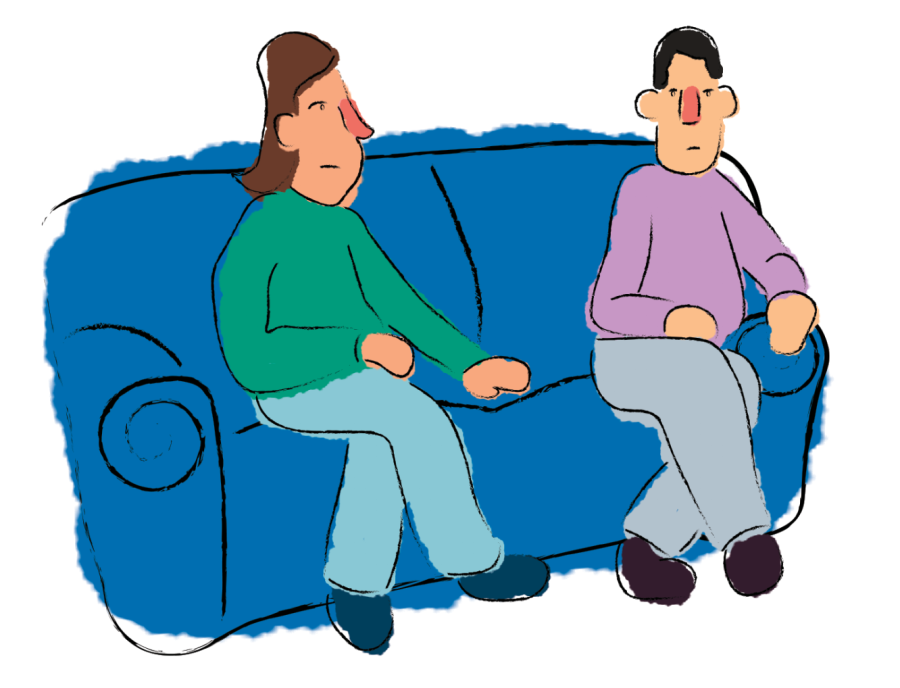Signs your partner is losing interest and how to deal with it
Three years of hanging out, getting to know each other and making memories was not enough time for junior nursing major Jacob Chassis to be sure he was in the right relationship with his ex-boyfriend.
In July 2019 they made their relationship official by agreeing not to date anyone else, but Chassis quickly lost interest, leaving his ex confused.
Knowing the early warning signs of a failing relationship like becoming distant, communicating less and showing less signs of affection may help prevent the partners from feeling blindsided and wondering what they could do differently to possibly save it.
Chassis started to distance himself from his ex three months into the relationship.
“I started focusing on my schoolwork and hanging out with friends more, giving him less of my time,” Chassis said. “I realized I wasn’t happy and did what was best for me by communicating less with him and focusing on myself.”
Joan Lucci, a licensed professional counselor at Middle Path Counseling Services in Kent, thinks if a partner is losing interest, they will be showing similar signs as Chassis.
“One of the first and most prominent signs (your partner is losing interest) is when your partner stops making time for you,” Lucci said.
In the beginning of a relationship, couples love being together or spend hours on the phone learning about each other. If one partner is too busy for the other or they have an arsenal of excuses as to why they can’t spend time with the other partner, that’s a red flag, she said.
Even if they’re spending a lot of time together, that doesn’t mean one partner won’t lose interest. They might express how they’re feeling by being less affectionate, causing the romance to dwindle.
“Maybe in the beginning of the relationship you have a lot of sex, date nights or lots of cuddling,” Lucci said. “When you notice there’s less of that, it’s a warning sign.”
Whether together or apart, the way your partner interacts with you is important, said Christina T. Hoehn-Shackelford, an outpatient licensed professional clinical counselor and owner of Alma Via Counseling Services in Cuyahoga Falls.
“He or she may seem less interested in what you say, slow to respond to calls and texts, ignore your attempts to connect, or no longer ask questions about you,” Hoehn-Shackelford said.
Initially recognizing these signs can be overwhelming, but it is important to address the problems right away.
“The best thing someone can do is be brave enough to have an upfront and honest adult conversation,” Lucci said. “You have to be strong enough to talk to them about how you’re feeling, what you’re noticing, and what seems to be lacking for you.”
Working to repair the relationship can take a lot of ongoing time and work from both parties.
The word “fix” in a relationship is not a productive one, said Morgan Enright, owner and licensed professional clinical counselor at Creative Family Wellness in Stow.
“Improvements can certainly be made but fixing implies that once the symptoms lessen or repairs are made in the relationship, that everything is now perfect,” Enright said.
Some ways couples can better tune into each other are by increasing quality time, finding shared meaning, seeking out a couple’s therapist to help navigate conflict or increase connectedness and go back to the beginning and talk about what they miss about the beginning of their relationship. In addition, couples can change it up and do something different, or if they’re fighting a lot, agree on a code word or signal to use when a break is needed to cool off, she said.
She also suggests reading a book or taking a relationship quiz
and recommends John and Julie Gottman’s “Eight Dates” or Gary Chapman’s “The Five Love Languages.”
“It’s important to think about how the two of you can problem-solve and identify some solutions if both partners truly want the relationship to continue,” Hoehn-Shackelford said.
But it might not be worth it to put effort into the relationship depending on the signs a partner is showing.
“If there is a loss of respect, fondness and admiration, a loss of we-ness, contempt and criticism, and other negative aspects that aren’t changing, then it may be better to end the relationship if one feels that it is unhealthy and toxic,” Hoehn-Shackelford said.
If a partner isn’t willing to make changes or acknowledge their partner’s thoughts and feelings, it may be difficult to make improvements in the relationship moving forward, she said.
A healthy long-term relationship is a result of both partners putting in the effort, and Enright thinks that without consistent nurturing of a relationship, it is normal for couples to become distant from each other over time.
“As time passes, people change as individuals as they grow and move through various experiences,” Enright said. “If you don’t put the time into your relationship, before you know it, you no longer know each other’s dreams, fantasy vacation spot or favorite book.”
Contact Andriana Ruscitto at [email protected].



